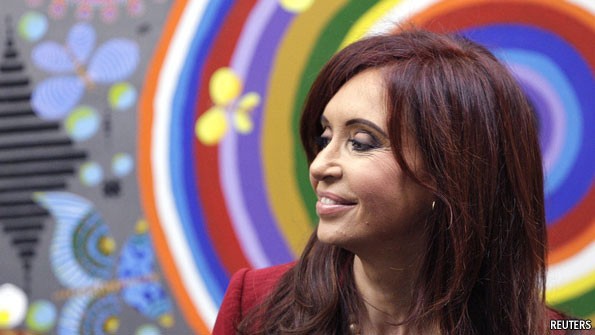Cristina Fernández de Kirchner struggles to fight against roaring inflation
Post on: 16 Март, 2015 No Comment

Cristina Fernández de Kirchner struggles to fight against roaring inflation; Argentina and China deepen their ties
Cristina Fernández de Kirchner struggles to fight against inflation
A day after Argentine President Cristina Fernández de Kirchner vowed not to devaluate the Argentine peso, the black market dollar broke through the ten-peso barrier. commonly called the Messi barrier. This is in reference to the famous football player’s jersey number (10). In a bid to calm currency markets and to stabilise the economy, the government announced two measures to bring the dollar back into circulation.
On Monday 6 May, Fernández promised in a nationally-televised address not to devaluate the Argentine peso during her time in office, claiming it would redistribute wealth from the rich to the poor. Indeed, businessmen and entrepreneurs are calling for a devaluation to make Argentine exports more competitive, hence boosting demand for exports and providing a jolt to the economy.
However, it could have negative effects on low and middle classes. Devaluation make imports more expensive, and this rise in prices weaken the population’s purchasing power. Argentina already has very strong taxes on imports, which make foreign products extremely expensive. Meanwhile, inflation continues to increase at a 20% rate.
Many businessmen and economists say the peso has become overvalued through years of inflation and that it is now an economic necessity to devalue the South American currency. By refusing a devaluation, Fernández is putting herself in opposition to the former liberal and right-leaning president, Carlos Menem (1989-1999). The Argentine president’s vow is also a way of limiting worries about the pesos potential collapse.
The Argentine people are already concerned about their economy and have been exchanging dollars in anticipation of a devaluation. In a bid to prohibit a dollarisation of the economy, the government has introduced strict foreign exchange controls to forbid access to dollars for most Argentines. Nevertheless, this measure was counterproductive as it made Argentines seek more dollars to hedge against inflation (25% annually according to private evaluations). This made the black market for the so-called “blue-dollar” soar.
On Tuesday, the black market dollar broke the Messi Barrier, while the official rate is still at 5.21 pesos to the dollar. Following this historic rate breakout, the government announced two measures to bring dollars back into the Argentine economy: a tax amnesty bill and other whitewashing financial instruments.

The first measure is called CEDIN and offers amnesty to taxpayers and companies with dollars hidden outside the system as long as they invest them in domestic construction or energy sectors. The second, BADE, is a bond that will be invested in the YPF oil company, which is 50 percent state-owned, and other energy infrastructure projects. The bond will come due in 2016 and pay 4% annual interest.
In 2009, a tax amnesty brought in some US$4bn from 32,000 people and 3,800 companies. However, due to Argentines’ distrust of their economy, many doubts have arisen as to the effectiveness of this measure. It is improbable that it will reverse outward capital flows and bring dollars back into the country.
Argentina and China deepen their ties
The Chinese President Li Yuanchao visited President Cristina Fernández de Kirchner and vowed to deepen Argentina-China ties.
The purpose of the visit was to signal that China wants to further develop trade relations in the South American country and increase cooperation in agriculture, judiciary issues, and education.














